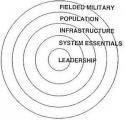... Just before midnight, the order “Fire!” — given by the squadron leader — could be heard in the Tel Aviv bunker. Within moments the first Hezbollah missile and launcher were blown up. Thirty-nine tense minutes later the squadron leader’s voice was heard again: “Fifty-four launchers have been destroyed. Returning to base.”
Halutz smiled with relief and called Ehud Olmert, the prime minister, who was enjoying a cigar as he waited by a secure red phone at his residence in Jerusalem.
“All the long-range rockets have been destroyed,” Halutz announced proudly. After a short pause, he added four words that have since haunted him: “We’ve won the war.”
Even as Halutz was declaring victory, 12 Israeli soldiers from the Maglan reconnaissance unit were already running into an ambush just over the border inside Lebanon near the village of Maroun a-Ras.
“We didn’t know what hit us,” said one of the soldiers, who asked to be named only as Gad. “In seconds we had two dead.”
With several others wounded and retreating under heavy fire the Maglans, one of the finest units in the Israeli Defence Forces (IDF), were astonished by the firepower and perseverance of Hezbollah.
“Evidently they had never heard that an Arab soldier is supposed to run away after a short engagement with the Israelis,” said Gad.
“We expected a tent and three Kalashnikovs — that was the intelligence we were given. Instead, we found a hydraulic steel door leading to a well-equipped network of tunnels.”
As daylight broke the Maglans found themselves under fire from all sides by Hezbollah forces who knew every inch of the terrain and exploited their knowledge to the full...
Hezbollah also suffered heavy casualties but its fighters slipped back into their tunnels to await the next round of fighting. It was immediately obvious to everyone in Tel Aviv that this was going to be a tougher fight than Halutz had bargained for.
As the war unfolded his optimism was brought crashing down to earth — and with it the invincible reputation of the Israeli armed forces.
In five weeks, their critics charge, they displayed tactical incompetence and strategic short-sightedness. Their much-vaunted intelligence was found wanting.
Their political leadership was shown to vacillate. Their commanders proved fractious. In many cases the training of their men was poor and their equipment inadequate. Despite many individual acts of bravery, some of the men of the IDF were pushed to the point of mutiny.
Last week, in an contrite letter to his soldiers, Halutz admitted to “mistakes which will all be corrected”. It is far from clear whether Halutz will remain in position to correct them...









Bookmarks